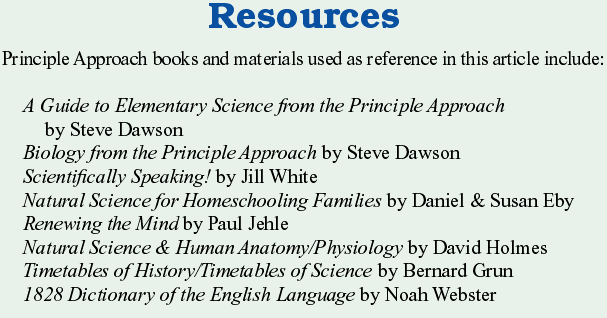 What constitutes a Biblical worldview of the discipline of science? In home education we must come to terms with how to teach God's view of science and not what man has decreed. My goal in teaching science in our homeschool is not so much experiments and mechanics but the why of God's world. I try to concentrate on what proves God to be the Author and Creator and what disproves the skeptics. I believe that children, no matter what their age, should be able to articulate why God is the Author of Life.
What constitutes a Biblical worldview of the discipline of science? In home education we must come to terms with how to teach God's view of science and not what man has decreed. My goal in teaching science in our homeschool is not so much experiments and mechanics but the why of God's world. I try to concentrate on what proves God to be the Author and Creator and what disproves the skeptics. I believe that children, no matter what their age, should be able to articulate why God is the Author of Life.
With the Principle Approach, we start our study of science by defining our terms so that we have a clearer picture of what we are to study. These terms include:
- Science: In a general sense, knowledge or certain knowledge; the comprehension or understanding of truth or facts by the mind.
- Philosophy: A collection of the general principles or leading truths relating to any subject arranged in systematic order. Pure science, such as mathematics, is built on self-evident truths; but the term science is also applied to other subjects founded on generally acknowledged truths, or on experiment and observation, such as chemistry and natural philosophy.
- Art: Derived from precepts or built on principles.
Other words that we will look up include natural, nature, natural history, natural philosophy, and the specific branch of science that we will be studying for the year. As these words are researched, they will lay the scriptural foundation we will build on.
A Principle Approach to science will be modeled after the classical heritage of America's colonial period. We learn the science (general principles) and the art (training in the skill) of the subject. We will take an overview of the whole subject and break it down into the part of science that we have chosen to study for the year. This way we will be able to master it more completely.
In a general introduction we would establish that:

Applying the Principles
Let's look at a specific area of creation - zoology. Our family decided to indulge in cats this year. We read in Proverbs 12:10, "A righteous man regardeth the life of his beast," and learned that we need to know how to be good stewards over the property which God had given us. Our definition of zoology is:
Zoology is a treatise on animals, or the science of animals, the branch of natural history which respects the forms, classification, history, and habits of animals, particularly of brutes or irrational animals.
Our vocabulary will continue with animal, form, class, habit, brute, beasts, mammal, and bird, and can be broken down even further with: invertebrate and vertebrate, oviparous, viviparous, and cetaceous. Scriptures will continue to help define our subject area (e.g. Gen. 1:26, Gen. 9:2, Psalm 50:10).

Our family is homeschooling in four grade levels this year, so each child will have a different "twist" on the subject being studied. The principle of individuality dictates this. The entire family will benefit by the strengths and insight that one child has over another in his selected area of study.
We also find a particular person in our branch of science to study about. This way we see how God has always had someone to fulfill His purpose in advancing His Story through time. We study the scriptures to help define the specific branch of our subject we are going to cover this time around.
The older children can read stories to the younger ones about important key individuals of zoology on the chain of Christianity. Find out who Louis Agassiz, Henri Fabre, and John Ray are and their contribution to zoology. Supplement your study with biographies about zoologists who are or were believers. What else can you think of? Books about animals are also great.
Remember, our topic is zoology, and we are specifically studying cats. To reinforce what we are learning, we split these activities among the children.
The Principle Approach is certainly a philosophy of education, but it is also a methodology. The children will research, reason, relate, and record their findings in a notebook. Depending on their age and ability they will begin to compile handbooks on science that will expand into various avenues as the years roll by. They will have at their fingertips a virtual resource library of distinct notes, drawings, diagrams, and research that they will know well because they will have reduced the subject from the whole to the part.
As we allow God to transform our lives by applying His Word in every area, we will see a generation rise up to refute the skeptics for the glory of God. The children of today will lead the world of tomorrow to believe in a God who is real and the Author of Science.
